 |
| The Independent Traveler's Newsletter PAGE FOUR |
 |
| The Independent Traveler's Newsletter PAGE FOUR |
| Three Special
Towns in Brittany
Pléneuf Val André  Pléneuf
Val André is a
charming coastal town on northern Brittany's Baie de Saint-Brieuc in the département of the Côtes d'
Armor,
part of the
larger resort known as Val André. It can first seem to
be a warren of little streets, winding up and down the hills and
occasionally only one way, but once you are there a half day, it
becomes
easy to navigate. Pléneuf
Val André is a
charming coastal town on northern Brittany's Baie de Saint-Brieuc in the département of the Côtes d'
Armor,
part of the
larger resort known as Val André. It can first seem to
be a warren of little streets, winding up and down the hills and
occasionally only one way, but once you are there a half day, it
becomes
easy to navigate.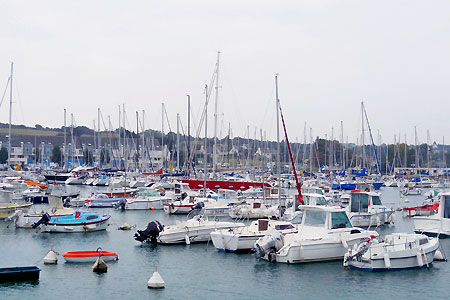 One of the first places we visited in Val André was the port at Dahouët recommended by the host at our B&B. At one time ships readied themselves here for fishing off the coasts of Newfoundland and Iceland, but today it is a pleasant marina with 329 pontoon moorings and a wonderful spot for a stroll along La Guette. As we meandered along on the walkway, we found ourselves taking photos of everything! Just snap away ~ you never know what memories you will capture! 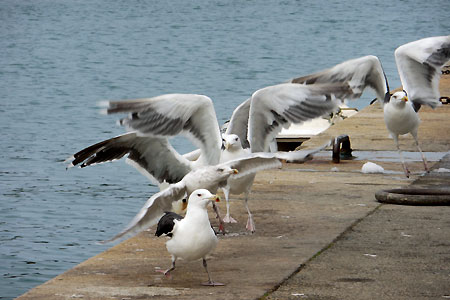 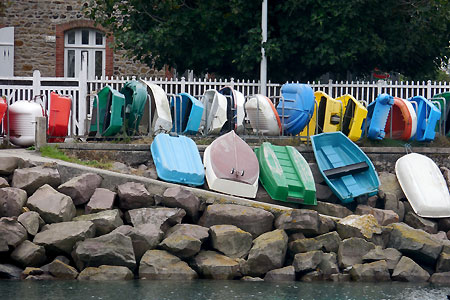 Gulls
coming in
for fishermen's leftovers and a colorful collection of rowboats at
water's edge
Back in town, we walked on the promenade along the beach ~ swimmers and sailboats to our left and a great choice of restaurants on the right. As in many much-loved French villages and hamlets, the locals hang baskets of flowers from lampposts. It added a bit of spring to this misty September day as the marine air came on shore.  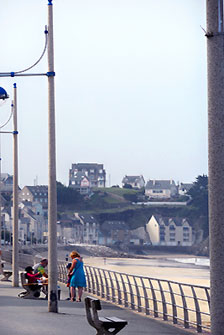 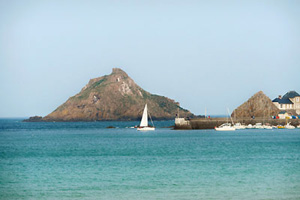 A basket
of hanging flowers,
the promenade along the beach, a
sailboat in turquoise waters off Pléneuf Val André
A bit of history: With origins in Paleolithic times, the market town of Pléneuf was founded in the 5th and 6th centuries by people from the British isles. A thousand years later, the Madeuc family built the Guémadeuc Château that was destroyed in 1590 during the Wars of the Leagues of Augsburg. The town was established as an administrative district in 1790 and boasts two prominent churches: Saint Peter-Saint Paul de Pléneuf built in the 19th century, and the older St-Alban Church built in the 12th century with many alterations over the centuries. Don't miss the fine stained glass window entitled The Passion of Jesus Christ from the 14th century which was listed in 1923 as a Historic Monument by the French government. Before long we were looking for a place for lunch and found ourselves dining outside along the rail above the beach at La Croisette. The service was very good, and we enjoyed fresh dorade and grilled vegetables - both superbe. [Dorade is served frequently in France. A recent article in the New York Times said of dorade - "a mouthwatering fish from the Mediterranean Sea, has captured the imaginations of European cooks for centuries. And now a variety of dorade . . . appears to have seduced some of Manhattan's most visible chefs."] After returning to our B&B to rest in the afternoon, we went back into town for dinner at La Villa (they do not have a web site) offering a variety of menu choices leaning toward Italian cuisine. At this point we would like to advise anyone reading reviews in Trip Advisor or other critiques to take bad reviews with a grain of salt ~ unless, of course, the majority of reviews are bad for a particular establishment. La Croisette received an average rating of 3.5 out of 5 on Trip Advisor and La Villa received 4 out of 5 ~ ratings we feel are fair. But, if you read the bad reviews, in the minority by far, you might be put off and miss dining in or staying at some really great places. There are always people who will find fault or who are difficult to please. We choose to trust the majority and try restaurants and accommodations for ourselves before making a judgment. Pléneuf Val André offers a lot to its residents and the tens of thousands of tourists who have discovered it, so we suggest that you visit in the autumn when it is not crowded. Not only is it a thriving community with facilities for boating, parasailing and more, it has two ports (the second, smaller port is Piégu with 120 moorings), but there is a yacht club, a tennis club in Parc d'Amirauté, a fine sandy beach of 2.5 kilometers protected by a seawall, a wilder beach called Des Vallées overlooked by an 18-hole golf course, and Ville Berneuf beach reaching as far as the town of Erquy. 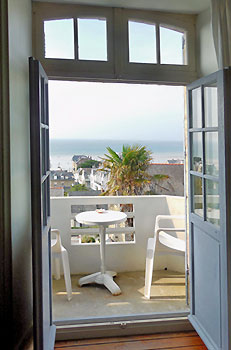 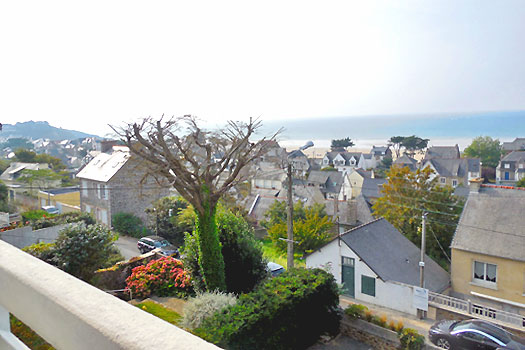 Perhaps what we enjoyed most were the utterly charming granite houses both at Dahouët and in Pléneuf Val André. We were fortunate to spend two nights in one of them, Villa Marguerite, in a lovely en suite room with a balcony overlooking the Bay. Our host, Christian Campion, couldn't have been more helpful and kind, and we not only had two great nights of sleep by the sea but enjoyed excellent breakfasts in the mornings and met other very interesting guests. Don't miss a visit to the proprietor's used mystery book store, filled with thousands of books in French that are available to purchased. We highly recommend Villa Marguerite on its quiet one-way street high in the hills over the town. Truly a treasure of a find. The Villa Marguerite and the home in Dahouët shown in the photo below are all uniquely Breton. Extensive use of granite with slate roofs creates substantial, sturdy, well-built houses that will last for centuries. 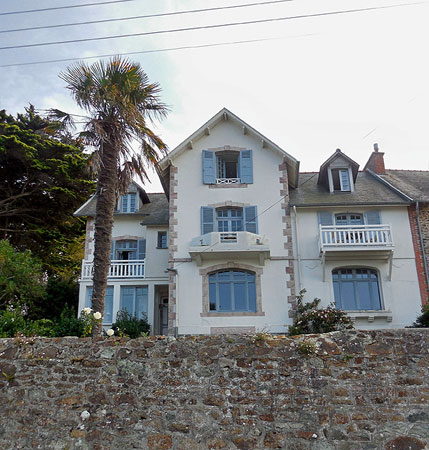 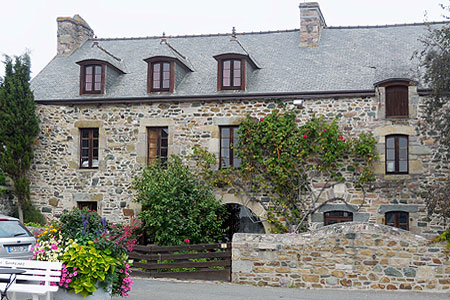 Villa Marguerite and
a house opposite the Dahouët marina
We hope you will put Pléneuf Val André on your list of must-see destinations in France. You will find it a most satisfying visit and a true Breton experience. Moncontour
But,
today's appearance belies the battles it endured from medieval
times to the 17th century. Because of its strategic location it was a
defensive position for the Breton Lords of Penthièvre. In
the 14th century there was the Breton War of Succession; in the 15th
century the
final conflict between the Breton duchy and the French state; in the
16th century the Wars of Religion. When, in the 17th century, the
ruling lord sided against King Louis XIII, the fortified town was
dismantled, but some of the ramparts still survive. The town was
saved by linen merchants, who sold their products far and wide and
became prosperous. This prosperity allowed them to build fine
homes and to improve their church building. The Eglise
St-Mathurin dates primarily to the 16th century with a Baroque
façade added two hundred years later and the unique bell tower
constructed in the 20th century. The delicate and exceptional
stained glass windows express the parish's prosperity, and some depict
the life of the medieval Breton saint, Yves. 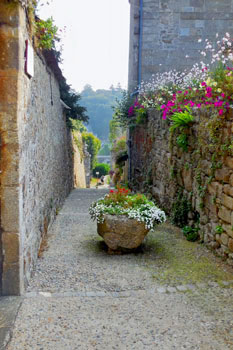 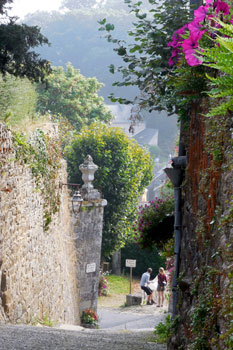 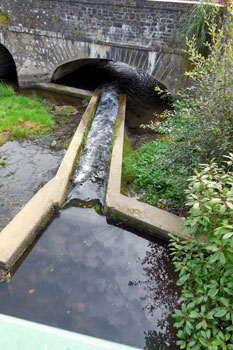 Pedestrian walk down to Jardin de l'Europe and the River Evron 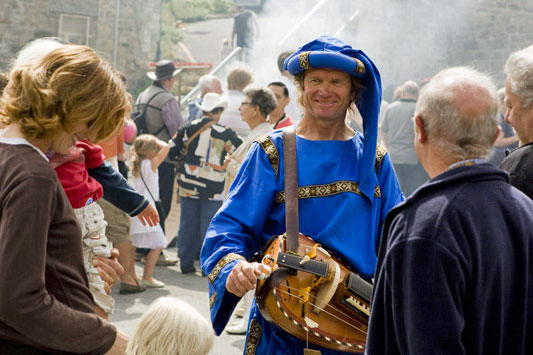  Every other summer Moncontour has its Medieval Fête ~ in 2015 it will be on August 2nd. People will invade this village, whose native population is under 950, to enjoy all the festivities, see the locals in costume, enjoy musicians, dancers, folks on stilts and other performers, watch potters and craftspeople make their creations, and simply enjoy the Fête Medievale of Moncontour. Vannes  Leaving the Côtes d'Armor
behind, we drove south to our destination for the next two nights
~ the
city of Vannes in the Morbihan département.
Taking the D768, we stopped along the route for lunch in Pontivy and
dined outside at a
restaurant in the square. Soon we were back on the
road and arrived in Vannes about 3:30, losing about a half hour trying
to navigate in the city to find our B&B. It is perfectly
located not far from the main attraction in the medieval part of the
city, Château de l'Hermine. As easy as it is to get around
France without getting lost, the larger towns and cities can be
confusing when you visit them for the first time.
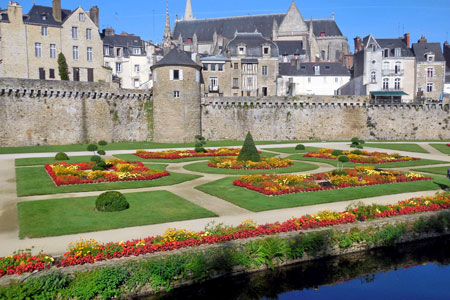 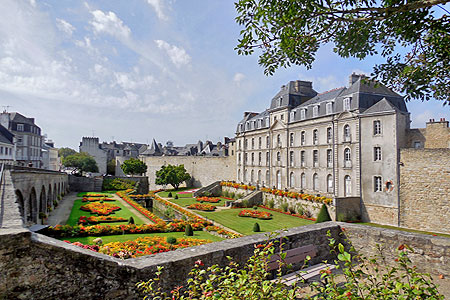 continued on page 5 |
|
| |
|
 previous
page
next page previous
page
next page |